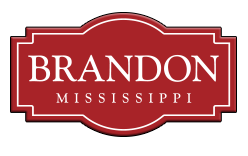
Brandon is consistently ranked as one of the Top 10 best places to live in Mississippi, as well as one of the Top 10 safest places to live in Mississippi. Brandon is celebrating her 193rd birthday this year, having grown from 31 residents in 1828 to over 25,000 today. Being one of the fastest growing cities in the state, people call Brandon their hometown because of the high quality of life evident throughout the community.
© 2025 City of Brandon | All Rights Reserved | Privacy Policy
Quick Links
1000 Municipal Drive
Brandon, MS 39042
Tel: 601.825.5021
Email: info@brandonms.org
Mailing Address:
City of Brandon
P.O. Box 1539, Brandon, MS 39043
Hours:
Monday – Friday | 8 AM – 5 PM
Scroll to Top

